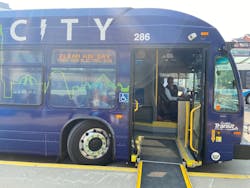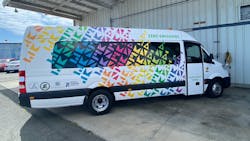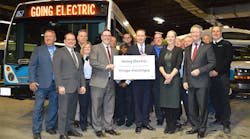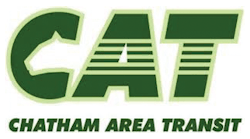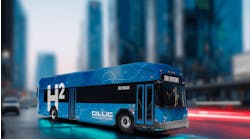Three regions in North America made news with their new zero-emission transit vehicles during the past week. They include a new electric paratransit van for Chatham Area Transit (CAT), the first electric bus to placed into service in the city of Guelph, Ontario, and the introduction of an autonomous electric shuttle from the Hawaiʻi Department of Transportation (HDOT).
CAT new paratransit vans
CAT in Savannah, Ga., held an unveiling event on June 9 to introduce the community to 10 Ford e-transit vans that will be used to serve CAT Mobility customers. CAT called the new vans “a transformative chapter in our commitment to get people where they need and want to go.”
To charge the paratransit vans, CAT partnered with Georgia Power on the installation of 10 electric vehicle charging stations at CAT Central. The agency says the chargers will further support the adoption of eco-friendly practices and help reduce the agency’s carbon footprint.
CAT placed its first fixed-route electric bus into service in April 2022, with plans to gradually transition its fleet as its diesel buses reach the end of their useful life.
First Guelph Transit electric bus
The city of Guelph celebrated Clean Air Day on June 7 with the introduction of Guelph Transit’s first electric bus into service.
The city reports its diesel-powered bus fleet accounts for one third of its greenhouse gas emissions. The transition to electric transit vehicles supports the municipality’s goal of becoming a net-zero community by 2050.
“Buying electric buses is an important step toward the city’s goal of electrifying our entire fleet of vehicles,” says Doug Godfrey, general manager of operations for Guelph. “Our goal for buses specifically is to replace seven diesel buses a year until we are fully electric. Every step we take toward electrifying our transit fleet has a positive and long-term impact on our local environment, and globally.”
A joint funding agreement in 2020 supports the city’s purchase of 65 new electric buses and the construction of its new Guelph Transit and Fleet Service facility, where its future fleet of electric buses will be housed. The first two buses from a September 2021 procurement arrived earlier in 2023, with the remaining nine expected to be delivered in 2024.
“This marks an important milestone in our commitment to reducing our carbon footprint in Guelph,” says Robin Gerus, general manager of Guelph Transit. “Our gradual switch to electric buses will provide an even more sustainable and eco-friendly option for transportation.”
HDOT develops autonomous shuttle
HDOT, in collaboration with the University of Hawaiʻi at Mānoa, unveiled its first autonomous electric shuttle. Phase 1 of the shuttle’s service plan includes being part of the university’s Rainbow Shuttle service that transports students and staff around the Mānoa campus. Phase 2 will see the vehicle providing customized mobility-on-demand services in East Kapolei communities.
HDOT explains the autonomous shuttle will be the first program to take advantage of Hawaiʻi’s Autonomous Vehicle Testing law. As the state moves toward electrifying its motor vehicle fleet by 2035, this pilot program will also provide HDOT with valuable information regarding all-electric fleet operations.
